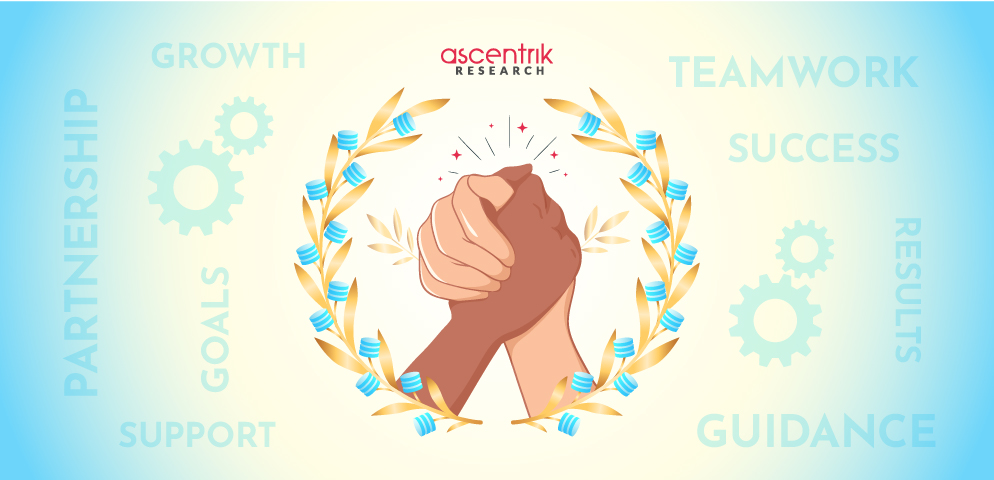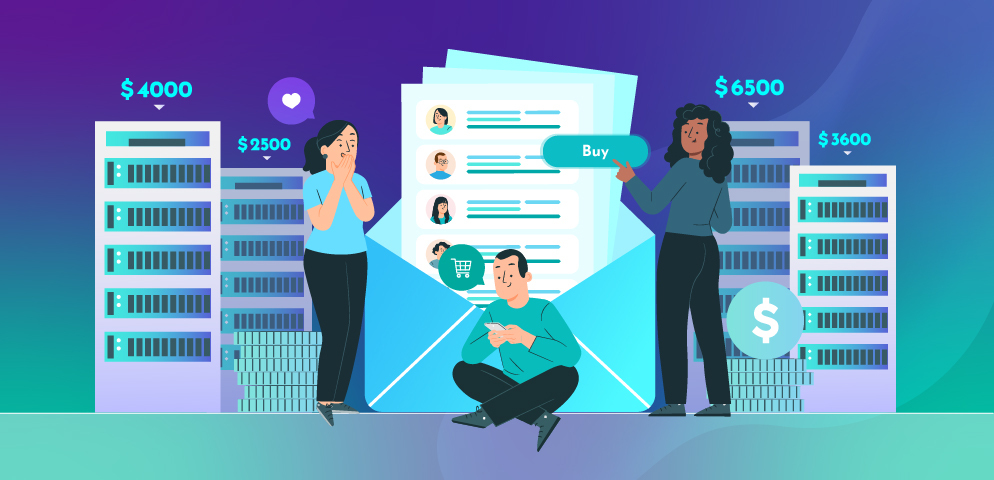
2024’s Definitive Guide to B2B Data for Sales Outreach
Published on 4th June,2024 Last Updated on 8th January,2025
Embarking on Effective Business Marketing with B2B Data
Why You Need the Best B2B Data for Every Industry
Role of B2B Data in Competitive Analysis
- Identifying Competitors: B2B data allows you to discover existing or new competitors in your field. By searching for similar companies, you can compile a list of key players.
- Analysing Strengths and Weaknesses: These databases provide details about competitors’ products, services, and market positioning. You can assess their strengths (e.g., unique selling points, customer base) and weaknesses (e.g., areas where they lag behind).
- Evaluating Strategies: B2B data offers insights into competitors’ marketing efforts, sales tactics, and business strategies. Understanding their approach helps you refine your own strategies.
- Locating Growth Opportunities: By analysing competitors, you can identify gaps in the market or areas where they haven’t fully capitalised. These gaps represent potential growth opportunities for your business.
- Assessing Your Position: B2B data allows you to benchmark your company against competitors. You can evaluate where you stand in terms of market share, customer reach, and overall performance.
The Role of Accurate B2B Data in Effective Lead Generation
In the dynamic world of business-to-business marketing, the power of data cannot be overstated. B2B data stands as a cornerstone, influencing every facet of modern lead generation strategies. Let’s delve into what B2B data encompasses, why it’s indispensable, and how it impacts lead generation.
Importance of B2B Data in Today’s Market
- Enhanced Targeting: By understanding the characteristics and needs of potential clients, businesses can tailor their marketing messages to resonate more effectively.
- Improved Customer Insights: B2B data offers a deeper understanding of current and potential customers, facilitating more personalised and impactful engagement strategies.
- Data-Driven Decision Making: With accurate data, companies can make strategic decisions based on trends and factual insights rather than assumptions.
- Increased Efficiency: By focusing efforts on high-potential leads and markets, businesses can achieve better results with fewer resources.
Data Quality and Accuracy
The effectiveness of B2B data-driven strategies hinges on the quality and accuracy of the data used. High-quality data leads to better decision-making, while poor-quality data can result in misguided strategies and lost opportunities. Regular data cleansing, validation, and updating are necessary to maintain data accuracy and relevance.
Application in Lead Generation
Accurate B2B data plays a pivotal role in lead generation. Accurate data ensures you reach decision-makers effectively, leading to better lead conversion.
- Data-Driven Lead Generation Strategies: Integrating B2B data into lead generation involves several key strategies. These include segmenting data for targeted campaigns, personalising marketing efforts, and ensuring that contact information is up-to-date and reliable.
- Maintain Data Quality: A clean and up-to-date database is essential for successful lead generation. Consider using reputable B2B data providers or conducting in-depth research to compile accurate information.
In summary, accurate B2B data is the backbone of effective lead generation. Businesses that harness the power of data will be better equipped to connect with potential clients, make informed decisions, and thrive in today’s competitive landscape.
How B2B Data Empowers Marketers and Salespeople with Sales Triggers and Buying Signals
In the fast-paced world of business-to-business marketing and sales, staying ahead of the curve is crucial. B2B data play a pivotal role in this endeavour by providing valuable insights that empower marketers and salespeople to make informed decisions. Let’s explore how B2B data offers information on sales triggers and buying signals, helping professionals optimise their outreach and drive revenue.
1. Sales Triggers: Unleashing Opportunities
- Real-time Updates: B2B data is constantly updated, ensuring that you have access to the latest information. When a significant event occurs (such as a leadership change), the database reflects it promptly.
- Custom Filters: Marketers and salespeople can apply filters to narrow down their search. For instance, they can filter by industry, company size, location, or job title. By doing so, they can pinpoint relevant triggers specific to their target audience.
- Job Title Database: B2B data often includes job titles, allowing professionals to identify decision-makers who can influence purchasing decisions. For example, if a new Chief Marketing Officer (CMO) joins a company, it could signal potential changes in marketing strategies or technology adoption.
2. Buying Signals: Decoding Intent
- Behavioural Data: B2B databases collect behavioural data, such as website visits, content downloads, and inquiries. When a prospect engages with your content or expresses interest, it’s a clear buying signal. For instance, a company downloading an ebook on cloud computing solutions indicates interest in that area.
- Predictive Analytics: By analysing historical b2b data, we can predict future behaviour. For example, if a company has consistently shown interest in cybersecurity solutions, it’s likely they’ll continue exploring similar offerings.
- Segmentation: Marketers can segment their audience based on buying signals. For instance, they can create a list of prospects who have interacted with specific product pages or attended webinars. This targeted approach ensures that sales efforts are focused on warm leads.
3. Enhancing Outreach and Conversion
Armed with insights from B2B data, marketers and salespeople can take strategic actions:
- Personalised Outreach: Knowing the triggers and signals allows for personalised communication. Whether it’s congratulating a new executive or addressing a specific pain point, tailored messages resonate better.
- Timely Follow-ups: When a buying signal is detected, prompt follow-ups are essential. B2B data helps prioritise leads based on their level of engagement, ensuring timely responses.
- Competitive Edge: By staying ahead of industry changes and competitor movements, businesses gain a competitive edge. B2B data provides the necessary intelligence for strategic decision-making.
In conclusion, B2B data is an indispensable tool for modern marketers and sales professionals. They unlock opportunities, decode intent, and pave the way for meaningful interactions. So, whether you’re targeting decision-makers or tracking buying signals, harness the power of B2B data to elevate your outreach and drive success.
Legal Compliance in B2B Databases: Navigating the Regulatory Landscape
In today’s data-driven business environment, B2B data plays a crucial role in connecting companies with their target audience. However, maintaining legal compliance is essential to protect consumer data and ensure ethical practices. In this article, we’ll explore the key aspects of legal compliance in B2B data and provide insights for businesses to navigate the regulatory landscape.
What Is B2B Data Compliance and Security?
- Regulatory Frameworks: Businesses must be aware of the legal requirements specific to their industry and region. Common regulations include the General Data Protection Regulation (GDPR) in the European Union, the California Consumer Privacy Act (CCPA), and industry-specific guidelines.
- Consent and Transparency: Obtain explicit consent from individuals before collecting their data. Clearly communicate how their information will be used and provide options for opting out.
- Data Accuracy: Ensure that your B2B data is accurate and up-to-date. Regularly verify and update contact information to maintain high data quality.
- Data Retention: Define retention periods for different types of data. Delete outdated or unnecessary records promptly.
- Security Measures: Implement robust security measures to prevent unauthorised access, data breaches, and cyber threats. Encryption, access controls, and regular security audits are essential.
Top B2B Data Aggregators and Their Compliance Features
Bookyourdata:
- Offers a 97% accuracy guarantee on contact information.
- Real-time email verification ensures data accuracy.
- Customizable list-building options for targeted outreach.
- Trusted by industry leaders like Oracle, and Harvard.
Zoominfo:
- Provides detailed company and contact information.
- Complies with GDPR and CCPA regulations.
- Regularly updates its database to maintain accuracy.
Rocketreach:
- Focuses on verified email addresses and direct phone numbers.
- Ensures compliance with privacy laws.
- Integrates with popular CRM systems.
LinkedIn Sales Navigator:
- Leverages LinkedIn’s extensive professional network.
- Adheres to LinkedIn’s privacy policies.
- Ideal for B2B lead generation.
Best Practices for B2B Data Compliance
To stay compliant, follow these best practices:
- Educate Your Team: Train employees on data protection laws and compliance requirements.
- Regular Audits: Conduct periodic audits to assess data handling practices and identify areas for improvement.
- Privacy Policies: Clearly communicate your privacy policies to customers and partners.
- Data Subject Requests: Respond promptly to data subject requests (e.g., access, rectification, deletion).
- Vendor Due Diligence: Vet B2B data vendors for compliance practices.
In conclusion, legal compliance in B2B data is not just a legal obligation—it’s a way to build trust with your audience and protect sensitive information. By following best practices and choosing reputable providers, businesses can navigate the regulatory landscape successfully.
Remember, compliance isn’t just about ticking boxes; it’s about respecting individuals’ rights and ensuring data integrity. As the B2B landscape evolves, staying informed and proactive is key to maintaining a compliant and ethical approach to data management.
Types of B2B Data Reviewed
Bookyourdata:
- An excellent choice for B2B email lists.
- Regularly updated for fresh data.
- Offers a 97% accuracy guarantee on contact information.
- Trusted by industry leaders like Zoom, Oracle, and Harvard.
- Customizable list-building options and real-time email verification.
ZoomInfo:
- Best for lead routing and management.
- Provides intent data for targeted outreach.
- Widely used by sales and marketing professionals.
UpLead:
- Prioritises data hygiene.
- Ensures high-quality leads.
- Ideal for prospecting and lead generation.
Lusha:
- Tracks sales engagement.
- Helps maintain accurate contact information.
Apollo:
- Offers comprehensive sales intelligence.
- Enhances lead scoring and engagement.
What to Keep in Mind About B2B Data
- Regularly update your database to maintain accuracy.
- Leverage advanced filters to target specific industries, roles, and countries.
- Consider research-based models for cost-effectiveness.
When selecting a B2B data aggregator, consider factors such as accuracy, coverage, customization options, and customer support. Look for databases that align with your industry and target audience.
Remember, B2B data is the backbone of successful marketing campaigns. Whether you’re a seasoned marketer or just starting out, understanding the nuances of B2B data will give you a competitive edge.
B2B data can be put to use in generating an accurate list of prospects for sales outreach. Ascentrik’s b2b data services provide accurate contact lists to target the right decision-makers from your target industry. Take a look at our services here.
Best Alternatives to Zoominfo and their Pricing
[dsm_perspective_image src="https://www.ascentrik.com/wp-content/uploads/2025/04/zoominfo-alternatives.jpg" title_text="Zoominfo alternatives" align="center" force_fullwidth="on" _builder_version="4.27.4" _module_preset="default" width="80%" module_alignment="center"...
Ascentrik Growth Story 2022 2023
B2B Data validation and enrichment is the practice of refining your existing CRM database by eliminating redundant and unwanted contact information and appending additional data points to your prospects’ records like phone numbers, industry, size of the company, designation, etc. It is one of the most beneficial practices for both your marketing and sales teams.
Refreshing your email list can be seen as an ongoing process during your marketing campaigns, as it allows you to source highly qualified leads, which enables targeting the right person with the right message. It can help your sales team with customer segmentation and lead scoring, allowing them to create personas for your prospects and craft a personalised sales pitch, improving the chances of converting them into customers.
But what is the most profitable method to get this highly valuable task done? Is it software tools for automated data enrichment or tools enhanced with data research by a team of experts? Find out the benefits of both in the article below.
How Much Does It Cost to Buy an Email List?
[dsm_perspective_image src="https://www.ascentrik.com/wp-content/uploads/2023/04/blog-feb-2023.jpg" alt="cost of email databases" title_text="Buy b2b email list" align="center" force_fullwidth="on" _builder_version="4.25.1" _module_preset="default" width="80%"...


